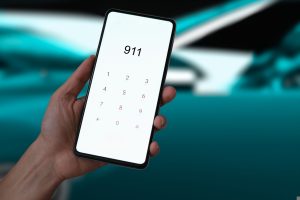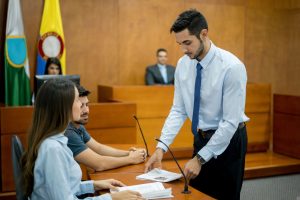 When domestic violence charges are filed in Fort Lauderdale, you may be concerned about one piece of evidence in particular: the 911 call. These recorded conversations can be pivotal in shaping how prosecutors and defense attorneys approach a case, yet many defendants don’t fully understand how this evidence works or what it means for their defense strategy.
When domestic violence charges are filed in Fort Lauderdale, you may be concerned about one piece of evidence in particular: the 911 call. These recorded conversations can be pivotal in shaping how prosecutors and defense attorneys approach a case, yet many defendants don’t fully understand how this evidence works or what it means for their defense strategy.
How 911 Calls Function as Evidence in Florida Domestic Violence Cases
In Florida’s criminal justice system, 911 recordings serve as contemporaneous evidence—capturing statements and emotions in real-time as events unfold. These calls typically contain several key elements that courts examine closely:
The caller’s emotional state is often immediately apparent through voice inflection, crying, shouting, or panic. Prosecutors frequently use this emotional distress to demonstrate the severity of an alleged incident and the victim’s state of mind.
Background sounds can be equally telling. Courts may hear shouting, arguing, physical altercations, or other contextual audio that either supports or contradicts the caller’s account of events.
Spontaneous statements made during the heat of the moment are generally considered more reliable than prepared testimony, making these recordings particularly powerful evidence under Florida’s evidence rules.
The Double-Edged Nature of 911 Evidence
What makes 911 calls particularly complex in domestic violence cases is their ability to cut both ways. While prosecutors may sometimes rely on these recordings to help establish their case, defense attorneys can use the same evidence to raise reasonable doubt.
When 911 calls help the prosecution:
- Clear statements describing violence or threats
- Emotional distress that suggests genuine fear
- Background evidence of ongoing altercations
- Requests for immediate medical attention
When 911 calls benefit the defense:
- Inconsistencies between the call and later testimony
- Exaggerated claims that don’t match physical evidence
- Evidence of the caller’s impairment or emotional instability
- Admissions that contradict the prosecution’s theory
Consider a case where a caller reports being “beaten up” but medical records show only minor scratches. Or when someone claims to fear for their life but the 911 recording reveals them yelling aggressively in the background. These inconsistencies can become powerful tools for the defense.
 Why 911 Calls Rarely Make or Break a Case
Why 911 Calls Rarely Make or Break a Case
Despite their dramatic impact, 911 recordings are just one piece of a much larger evidentiary puzzle. Florida courts require prosecutors to prove domestic violence charges beyond a reasonable doubt using the totality of evidence available.
The limitation of audio evidence is that it captures only a snapshot of events. As a Fort Lauderdale criminal defense lawyer can explain, there’s no visual context, important details may be missing or misinterpreted. A person might sound panicked due to fear, intoxication, mental health issues, or even anger rather than victimization.
Timing can be misleading as well. What sounds like an immediate response to violence might actually be a reaction to an argument that occurred hours earlier, or the culmination of mutual combat rather than one-sided aggression.
Other Critical Evidence That Shapes Domestic Violence Cases
Fort Lauderdale domestic violence cases typically involve multiple types of evidence that can have substantial impact on the outcome:
- Medical records and photographs provide objective documentation of injuries—or the lack thereof. When 911 calls describe severe violence but medical evidence shows minimal injury, this creates reasonable doubt about the severity or nature of the alleged incident.
- Text messages and social media communications often reveal the ongoing dynamics between parties. These digital records can show patterns of behavior, threats, reconciliation attempts, or evidence that contradicts official statements.
- Witness testimony from neighbors, family members, or responding officers can either corroborate or undermine the 911 caller’s account. Sometimes witnesses provide crucial context that the audio recording cannot capture.
- Physical evidence from the scene—broken items, damaged property, or the defendant’s injuries—helps reconstruct what actually occurred versus what was reported.
- Police body camera footage has become increasingly important, capturing the immediate aftermath of incidents and the demeanor of all parties involved.
- Prior incidents or patterns may be introduced to establish context, though Florida’s evidence rules carefully limit when and how this information can be used.
The Complexity of Domestic Violence Defense
Domestic violence cases in Fort Lauderdale involve unique legal challenges that extend far beyond typical criminal defense work. These cases often intertwine with family court proceedings, immigration issues, professional licensing concerns, and long-term relationship dynamics.
- The intersection with injunctions means that criminal charges often run parallel to civil protection order proceedings. Evidence from 911 calls can impact both cases simultaneously, requiring careful coordination of defense strategies.
- Victim cooperation issues frequently arise when alleged victims don’t want to prosecute, change their stories, or seek to reconcile. However, prosecutors can often proceed with cases even without victim cooperation, using 911 recordings as primary evidence.
- Enhanced penalties under Florida law mean that domestic violence convictions carry serious consequences including mandatory counseling, potential firearm restrictions, and enhanced sentences for repeat offenses.
Why Specialized Experience Matters
The stakes in domestic violence cases extend far beyond potential jail time. Convictions can affect employment opportunities, professional licenses, child custody arrangements, immigration status, and fundamental rights like firearm ownership.
- Understanding the prosecution’s approach is crucial because state attorneys in Broward County often have specialized domestic violence units with specific protocols and strategies. An experienced domestic violence defense attorney knows how these prosecutors think and can anticipate their moves.
- Technical expertise with evidence becomes essential when challenging 911 recordings. Issues like audio quality, chain of custody, proper foundation, and hearsay exceptions require specific knowledge of evidence law as applied to domestic violence cases.
- Negotiation skills in this context differ significantly from other criminal matters. Prosecutors may be willing to consider alternative resolutions like pre-trial diversion or reduced charges, but only when presented with compelling mitigation or strong challenges to their evidence.
- Trial experience specific to domestic violence matters provides insight into how Broward County juries respond to different types of evidence and arguments. What works in a drug case may backfire completely in a domestic violence trial.
Moving Forward with Your Defense
If you’re facing domestic violence charges in Fort Lauderdale, understanding how 911 calls fit into the broader evidentiary picture is crucial for making informed decisions about your case. While these recordings can seem overwhelming, they represent just one element that skilled defense counsel can address within a comprehensive strategy.
The key is working with a criminal defense attorney who understands not just criminal law generally, but the specific nuances of domestic violence prosecution in South Florida. These cases require a defender who can navigate complex evidence rules, understand the intersection with family court proceedings, and develop strategies that account for the unique dynamics these charges create.
Remember that every domestic violence case is different, and the impact of 911 evidence varies dramatically based on the specific facts and circumstances involved. What matters most is having experienced counsel who can evaluate all the evidence—including those recorded calls—and build the strongest possible defense for your particular situation.
Call Fort Lauderdale Criminal Defense Attorney Richard Ansara at (954) 761-4011. Serving Broward County.
More Blog Entries:
Can Domestic Violence Charges Be Dropped in Broward County? Understanding Your Rights and Options, June 3, 2025, Fort Lauderdale Criminal Defense Attorney Blog
 Fort Lauderdale Criminal Attorney Blog
Fort Lauderdale Criminal Attorney Blog


